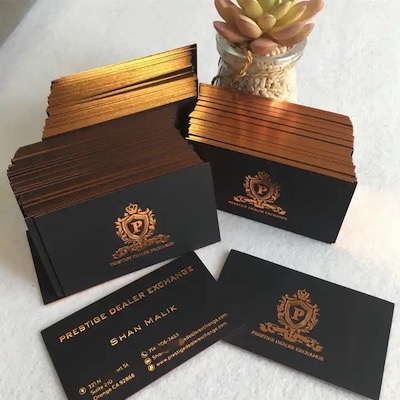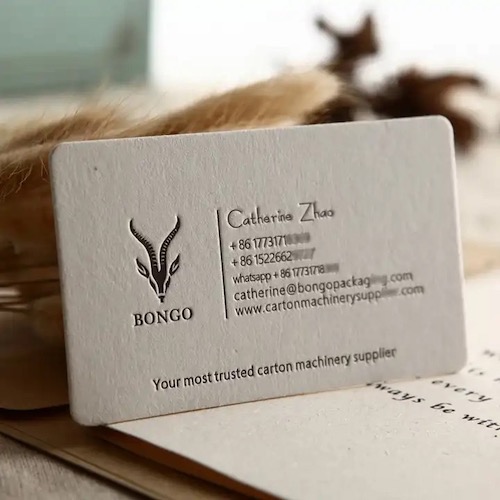Content Menu
● Design of Custom Business Cards
● Printing Custom Business Cards
● Materials for Custom Business Cards
● Benefits of Custom Business Cards
● Trends in Custom Business Cards
In today's competitive business landscape, a well-designed business card is more than just a piece of paper; it is a powerful marketing tool that can leave a lasting impression. Custom business cards allow you to showcase your brand's identity, making them an essential element of networking and professional interactions. This article explores various aspects of custom business cards, including design, printing, materials, benefits, and current trends.

Design of Custom Business Cards
The design of your business card is crucial as it reflects your brand's personality. A well-thought-out design can attract attention and convey professionalism. Here are some key considerations for designing custom business cards:
1. Simplicity and Clarity: A clean and simple design often works best. Avoid cluttering the card with too much information. Focus on essential details like your name, title, company name, and contact information.
2. Brand Colors and Fonts: Use colors and fonts that align with your brand identity. Consistency in branding helps in recognition and recall.
3. Unique Shapes and Sizes: While the standard business card size is 3.5 x 2 inches, experimenting with different shapes and sizes can make your card stand out. Consider rounded corners or square cards for a modern touch.
4. Visual Elements: Incorporate your logo and other visual elements that represent your brand. High-quality images and graphics can enhance the overall appeal of the card.
Printing Custom Business Cards
Once you have a design, the next step is printing. The quality of printing can significantly affect the perception of your business card. Here are some printing options to consider:
1. Digital vs. Offset Printing: Digital printing is cost-effective for small runs, while offset printing is ideal for larger quantities, offering better color accuracy and quality.
2. Finishes: Various finishes can enhance the look and feel of your cards. Options include matte, glossy, and textured finishes. Specialty finishes like foil stamping or embossing can add a luxurious touch.
3. Paper Quality: The choice of paper stock is vital. Thicker cards (e.g., 14pt or 16pt) feel more substantial and convey quality. Recycled paper options are also available for eco-conscious brands.

Materials for Custom Business Cards
The material of your business card can influence its durability and impression. Common materials include:
1. Cardstock: Standard cardstock is widely used for its balance of cost and quality. Options range from 300 gsm to heavier stocks for a premium feel.
2. Plastic: Plastic cards are durable and waterproof, making them ideal for outdoor or rugged environments.
3. Recycled Materials: Eco-friendly options are increasingly popular, appealing to environmentally conscious consumers.
Benefits of Custom Business Cards
Investing in custom business cards offers numerous benefits:
1. Professionalism: A well-designed card conveys professionalism and attention to detail, enhancing your credibility.
2. Networking: Business cards facilitate networking by providing a tangible way to share your contact information. They serve as a reminder of your interaction.
3. Cost-Effective Marketing: Compared to other marketing tools, business cards are relatively inexpensive. They can be produced in bulk, making them a cost-effective option for small businesses.
4. Brand Recognition: Custom cards help reinforce your brand identity, making it easier for potential clients to remember you.
Trends in Custom Business Cards
Staying updated with design trends can help your business cards remain relevant and appealing. Some current trends include:
1. Minimalism: Clean designs with ample white space are gaining popularity, allowing essential information to stand out.
2. Printed Edges: Adding a pop of color to the edges of your cards can create a striking visual effect.
3. Unique Textures: Incorporating textures, such as linen or felt, can add a tactile element that enhances the card's appeal.
4. Interactive Elements: QR codes or augmented reality features can make your business card more interactive, providing additional information or links to your online presence.
Custom business cards are an essential tool for anyone looking to make a strong impression in the business world. By focusing on design, quality printing, and the right materials, you can create a card that not only represents your brand but also serves as a powerful marketing tool. Keeping up with trends ensures that your business cards remain fresh and relevant, helping you stand out in a crowded marketplace. Whether you are a freelancer, entrepreneur, or part of a larger organization, investing in custom business cards is a decision that can pay off significantly in the long run.































